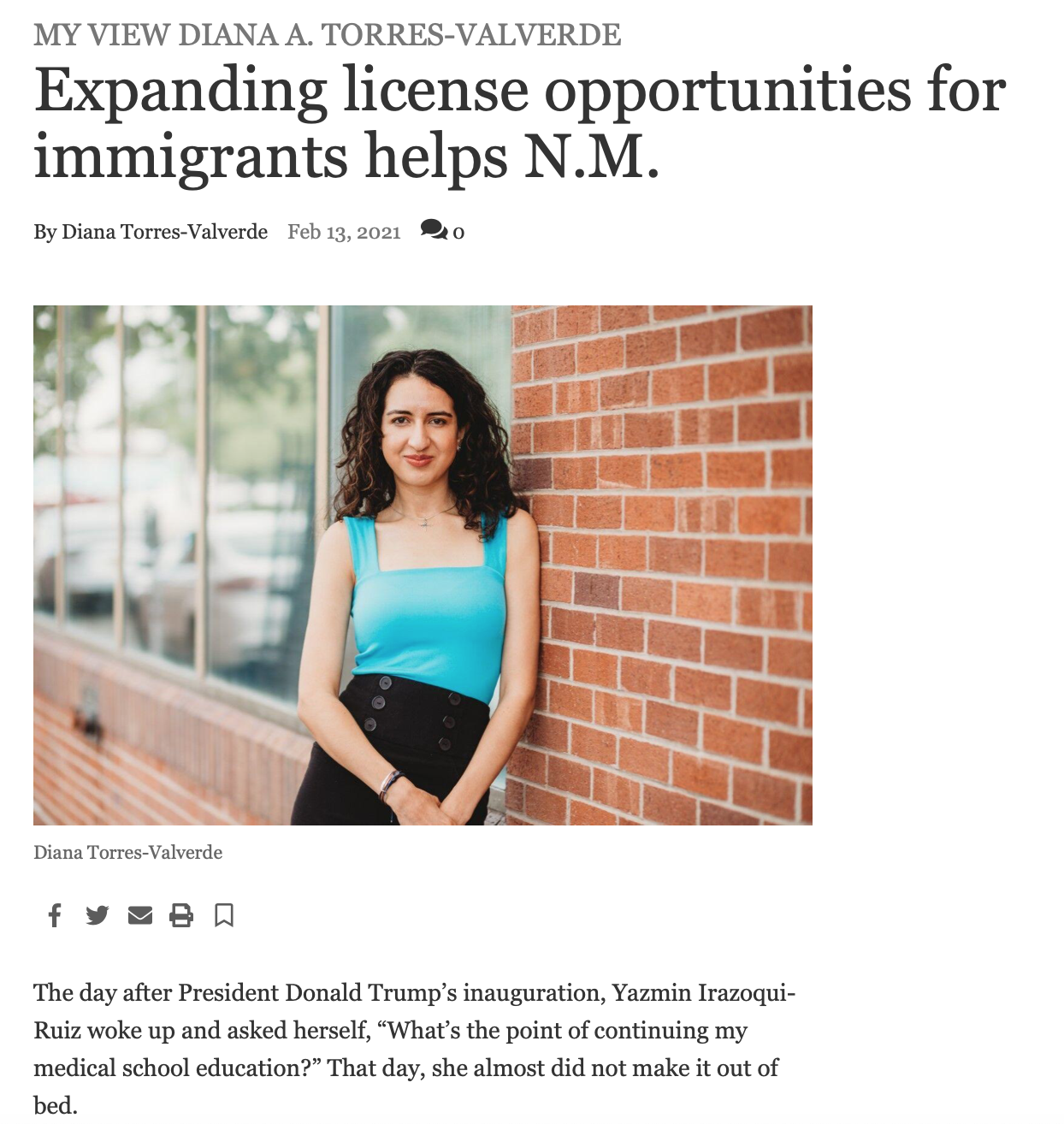Op Ed: “Expanding License Opportunities for Immigrants Helps N.M.”
This op-ed, written by NMILC staff attorney Diana Torres-Valverde, is about the impact of SB 219 (read more: SB 219: No Citizenship Proof For Occupational License) and her personal experience.
The day after President Donald Trump’s inauguration, Yazmin Irazoqui-Ruiz woke up and asked herself, “What’s the point of continuing my medical school education?” That day, she almost did not make it out of bed.
She was, after all, one of the “DACAmented” young adults who Trump wanted to boot out of the country as soon as he got a chance. And she was a member of the LGBTQ community, another group that Trump relished attacking. How could she not feel a sense of hopelessness?
Thinking about her journey to medical school was the only thing that got Yazmin out of bed that Saturday morning.
Yazmin made it through medical school due to a combination of grit, determination, faith and support from her family and community. She could not have made it through any other way. As an undocumented student, she could not qualify for traditional student loans due to her status.
So, during her first year and a half of medical school, she worked full time to pay for school out of pocket. Her schedule during that period was grueling. Sometimes she only got four hours of sleep to manage her school assignments and work obligations. But she did what she had to do.
During her first year in medical school, Yazmin confided in a financial aid officer about her struggle and explained, “This may be the first time you see this happening to a student, but it won’t be the last.” The financial aid officer proceeded to advocate for Yazmin and for those who would follow. As a result, the medical school created an internal loan program for students like Yazmin. This change eventually allowed Yazmin to focus full-time on school. But her challenges were not over.
Another hurdle loomed on the horizon.
On Jan. 1, 2020, a few months before Yazmin’s graduation from medical school, New Mexico lacked legislation that bypassed federal laws that bar professional licenses for undocumented people.
This meant that even though Yazmin had met all of the requirements to be a medical doctor in New Mexico, there was the uncertainty of whether she could obtain a medical license in New Mexico to pursue her career as a surgeon. Perhaps, to pursue her dream career, she would have to move to another state.
She was not alone in this dilemma. Dozens of young students had graduated or were about to graduate with medical, teaching, nursing, and a myriad of other professional degrees and they, too, could not obtain professional licenses in New Mexico simply because they were not legal U.S. residents or citizens.
The fact that undocumented students could not obtain a professional license in New Mexico did not make sense from a fiduciary or policy standpoint. In 2005, the New Mexico Legislature passed Senate Bill 582, a law that provides in-state tuition and state funds, such as the lottery scholarship, to all students who attend one year of secondary education in New Mexico, regardless of status.
This means the state of New Mexico invested in undocumented students’ K-12 education and college tuition, yet failed to provide a pathway for them to serve the state as doctors, teachers, nurses and other professionals. By denying New Mexican undocumented students’ right to work as doctors or nurses, the state was losing gravely needed professionals and its educational investment to other states.
Yazmin, other undocumented students and their allies saw this challenge as an opportunity to change New Mexico laws so they could pursue their professions in New Mexico.
During the 2020 legislative session in New Mexico, the New Mexico Immigrant Law Center, the New Mexico Dream Team, New Mexico Voices for Children and countless young undocumented or “DACAmented” students like Yazmin tirelessly advocated to pass Senate Bill 137.
The bill removed immigration status as a barrier to professional and occupational licensure or certification for professions or occupations that did not statutorily require a specific type of immigration status. This bill gave teachers, dental hygienists, doctors, nurses, respiratory therapists and other vital professionals the right to obtain a professional license regardless of their immigration status.
Once Gov. Michelle Lujan Grisham signed this bill into law, things changed for Yazmin. She had the option to pursue her career as a doctor in New Mexico, so she did. Dr. Irazoqui-Ruiz is now a general surgery resident at the University of New Mexico.
Although SB 137 helped many young adults access professional licenses regardless of their immigration status, it did not repeal statutes for professions or occupations that statutorily require a specific type of immigration status. Examples of occupations that still require U.S. citizen or legal permanent resident status in New Mexico include optometrists, physical therapists, real estate agents, home inspectors and bail bondsmen.
This year, the New Mexico Immigrant Law Center, the New Mexico Dream Team and New Mexico Voices for Children will try to expand on the progress of SB 137 by passing Senate Bill 219, a bill that aims to eliminate statutory barriers to professional licenses in existence for undocumented students.
This bill will give more young adults like Irazoqui-Ruiz the opportunity to pursue their careers of choice in their home state. In turn, these young professionals will offer New Mexicans their valuable skills and allow our state to reap the rewards of its decades-long educational investment in undocumented youth.
Diana A. Torres-Valverde is an attorney at the New Mexico Immigrant Law Center, an organization that seeks to empower immigrants in New Mexico. This article was originally published by the Santa Fe New Mexican on February 13, 2021.
Published February 22, 2021
Written by Diana Torres-Valverde, NMILC staff attorney.
Originally published in the Santa Fe New Mexican

